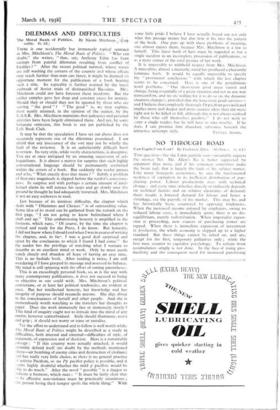NO THROUGH ROAD
Can Capital:sm Last? By Frederick Allen. (G-311anc 75. 61) THIS question—like the I.atin particle own—invariably expects the answer No. Mr. Allen's No is better supported by argument than most, and if his sentences sometimes make the brain reel, that is largely the fault of his subject matter. Like many bourgeois economists, he secs the fundamental weakness of capitalism in its inefficient distribution of pur- chasing power. Labour productivity rises with technical change ; and every time (whether directly or indirectly depends, on technical factors- and on relative elasticities of demand) there results a lowered demand for labour and hence a shrinkage, via the payroll, of the market. This may be, and has historically been, countered by opposing tendencies. When the increased income enjoyed by employers, owing to reduced labour costs, is immediately spent, there is no dis- equilibrium, merely redistribution. When imperialist expan- sion is proceeding, new sources of purchasing power are tapped. When there is immediate expanSion of investment in prOuction, the whole economy is stepped up to a higher standard. But these things cannot he relied on, and arc,. except for the first, temporary palliatives only ; while the first runs counter to capiialist psychology. To refrain from accumulation simply is not done. In the face of rising pro- duCtivity and the consequent need for increased purchasing' power we find a constant drain of funds into the " finance circulation "—the exchange not of new goods but of old titles and properties. The pursuing bogy of overproduction grows more formidable with every expansion of investment and markets. Not merely progress, but constant acceleration is essential to capitalism ; and as the earth and the exploitable backward communities thereof are limited, the thing simply cannot be done. Capitalism cannot last.
Mr. Allen is more careful and less prone to absurdity than most writers of books with similar titles. He does not present capitalism merely as a device for driving down standards of living nor deny—as do some less cautious—that these have notably risen over the last hundred years. He does not argue that foreign trade is barren of advantage. He does not envisage a " collapse " of the capitalist system, economically speaking. More realistically, he sees the next crisis resulting in such hardship that its history will " pass from the economic to the political arena," or, alternatively, precipitating war with a revolutionary aftermath. He answers most of the more obvious criticisms as he goes. One cannot anywhere drive a coach and four happily through the whole argument and close the book with the feeling that all's well, it's all eyewash.
But let it be allowed that capitalism cannot last if it goes on behaving as at present—a proposition supported by many besides those of Mr. Allen's political convictions. Is it also true that no modifications in its behaviour, short of that expropriation of the expropriators which would constitute its actual decease, can solve the problem of purchasing power and production ? Is Mr. Allen's analysis unescapable, his list of remedies exhaustive ? Surely neither. His analysis of the wage-bargain, an essential part of his argument, rests entirely on the supposed annihilation by Mr. Maurice Dobb of the marginal productivity theory of wages. Most of those who followed that controversy will agree that that is not good enough. Again, the secular downward price trend which would follow from a limited purchasing power and an increasing productivity need only result in depression so long as it is not recognised and made the basis of profit calculations. Admittedly the calculations involved are difficult, possibly so much so as to rule out in practice that smooth regression of the cost of living to the level of sixpenny overcoats and five- pound cars which is the dream of the " neutral money " school. But it is at all events a theoretical possibility. Finally, Mr. Allen contends that the assumption by the State of the function of issuing purchasing power—a notion which dates back past Marx to Bishop Berkeley—would constitute the end of capitalism. Will all good Communists, then, once the Labour policy of nationalising the banks has been achieved, fold their hands and say Nunc Dimittis? Another question expecting, unmistakably, the answer No. HONOR CROOME.















































 Previous page
Previous page